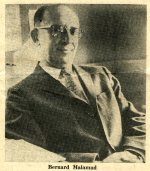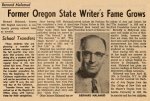
The third and last novel Bern wrote in Corvallis was A New Life, an academic novel - that is, a story usually about faculty in a campus setting. He always wrote three typings of his script - the first taking the longest time and all three about three years. The only people who knew any details about the work were Bern, his wife, and his editor. Thus, I was surprised one afternoon when Bern handed me a copy of the third script of A New Life. He told me that I was not in the story and that I was not to tell anybody anything about it. I was to look for errors of any kind. I read carefully but found little to list. There were a few vocabulary inaccuracies - such as to call the drinking-water container in the hall a bubbler several times, then a fountain several times more, and finally something else. I questioned some of the commas' presence or absence, but he said that in most cases he used or didn't use them in order to maintain the rhythm he wanted for the sentence.
True, I was never suggested as being in the novel, but the Hudson automobile I drove from Colorado was. He rang one evening to ask what model of car I had driven and if I had a picture of it. I did and lent it to him. Later I mentioned to him that I thought he had become interested in my car because of its name: Hudson. In the novel, his central character (Levin, which means light) learns how to drive and then undertakes a trip to the coast for an assignation - an adventure, such as the explorer Hendrick Hudson's discovering the Hudson River and venturing into Hudson Bay in what is now Canada. The word had strong connotations. Bern listened to me but said nothing. He rarely commented on his intention, but he was very exacting and purposeful. For instance, when he wanted to know about furniture, he called me because I did so much refinishing. When he dealt with nature - particularly in A New Life - he called Larry Blaney, a botany friend, for precise wording and description. And there were others for expertise consultation.

Credit: Bennington (VT) Banner, 1961.
"Book Review: Malamud’s Unsubmerged Man." Lisa Tate. The Banner, Bennington, VT. October 21, 1961.
One afternoon, when a sample copy of the jacket for A New Life arrived in the mail, I asked Bern if the coloring was intentional. Backgrounded by a gaudy flowering wallpaper, a round mirror had a frame painted with two circles - one within the other - in black and orange - O.S.C.'s colors. Suddenly seeing this unintended identification, Bern grabbed the phone to call New York to stop press. Repainted green and black, the rings lost their unwanted implications.
For A New Life, Bern unquestionably drew upon various faculty members for their mannerisms. For instance, the recognizable traits of two quite different English instructors - R.D. Brown and Spencer - were intermingled in the creation of a character: Bern told me so. R.D. either didn't want to be identified or didn't recognize his presence because I heard him say he was not in the book. In contrast, a woman in the department must have wanted to be in a novel because she proclaimed to have been the model for the departmental woman in the book, but she was the only one who thought so - no two women could have been so different. And the unique manner of speaking by a department professor was exquisitely delivered by a character whose activities were quite different from those of the actual professor, Herb Childs, who recognized his language and glumly took a sour pride in having been used. When the bookstore wrongly released the book for sale before its publication date, I quickly phoned a friend to alert him that he was recongizable in the book, but that by the end he emerged clean. The central character, Levin, is Jewish and arrives fresh from New York to an Oregon college town, but that does not make Bern the protagonist.
A few ladies in Corvallis developed annotated copies of the book of who was who and where was where. For instance, at one point in the story, an elderly man has some of the characteristics of the Liberal Arts Dean Colby; in the text he dies on a bench in a triangular park like one on Arnold Way, but the real dean lasted many years more. The readers who specified the identities were probably too factually minded to understand or enjoy the novel itself; they got their kicks from thinking that they were collecting meaningful facts. What they accomplished occasionally was to embarrass an innocent vicitim. In all this supposed scholarship, they overlooked the origin to the final statement, "I gotcha pitcher," which in life as well as in the book was used by a camera enthusiast, the department head.
One incident in the script had a different manner of entry. After having read the book, Walter Foreman asked Bern whether he - Walter - would be given credit for Levin's roadside adventure. While driving through Kansas, Walter had stopped for water from a nearby stream. A farmer on a tractor drove over to Walter, got off, and gave Walter a piece of string to hold. The other end was attached to one of the farmer's teeth. The farmer said, "Hold tight," backed away, and gave his head a jerk. To his intent and satisfaction, the tooth popped out, and the farmer drove away. Walter had told the story to Bern a while back, but Bern had no recollection of it whatsoever. Apparently, it had sunk into his memory and lost its identity but later emerged on need.
Some local readers who were disappointed in the novel claimed that Bern had written it only to get even with O.S.C. and the English department from having been neglected and misused. I have heard him say publicly that such an interpretation was absolutely untrue. Actually, all of us in the Lower Division had suffered from the policies of the Board of Higher Education and the receptiveness of the administrators right down to the department. Bern's promotion to assistant professor was eventually brought about by President Strand's intervention upon his recognition of Bern's increasing standing in the literary world. Bern certainly was critical of campus activities and policies, but to say he was "getting even" was willfully misinterpreting the intent, content, and style of the writing.
In a campus newspaper interview, Bern said about his novel, "If you can't get a laugh out of A New Life, I don't know what the hell you can get a laugh out of." The organization of the novel falls into two parts: The first is broadly amusing; the second turns serious. My interpretation of this is that the basic theme is about love; first it is shown in a series of laughable incidents, and then it motivates a couple into a complicated situation they had little control over. I told my opinion to Bern upon his asking me, and again he listened. But he didn't blow his top or look appalled or fierce, so I assume I wasn't too far off.
Bern showed me a letter he had recieved from an English department faculty member in a Midwestern university who asked, "When were you here; you have captured us perfectly?" Bern had never been there and had to look it up on a map. This statement is a credit for Bern's writing having captured what could be a representative college community.
The Malamuds left Corvallis late in August 1961. The book went on sale in the O.S.C bookstore in mid-September. Some faculty of the old guard were indignant. An elderly chairman of the history department (he kept his age secret) caught me in a hall of the old library and with venom blasted me for what Bern was not available to hear. My case was one of applied guilt by association. Also, for months I was subject to all manner of questions from acquaintances as well as from people I didn't know.

OSU Daily Barometer, May 22, 1964.
"Former Oregon State Writer's Fame Grows". OSU Daily Barometer, May 22, 1964.
Bern, however, had become a recognized writer. He had left Corvallis because he had been invited to teach a seminar at Harvard and then move to Bennington, Vermont, to teach at Bennington College, both enviable assignments. There he remained for the rest of his academic career.
With regrets he left his Corvallis friends, but he was sufficently business minded to feel uneasy about being so far away from New York, if only because that's where publishing was and is. He would be closer to the action. Also he told me that he had used up for his purposes what Oregon had to offer and needed to be exposed to something different. But we kept in communication by innumberable letters and phone calls. They visited here, and I saw them several times in New York and Bern once at London's airport.

